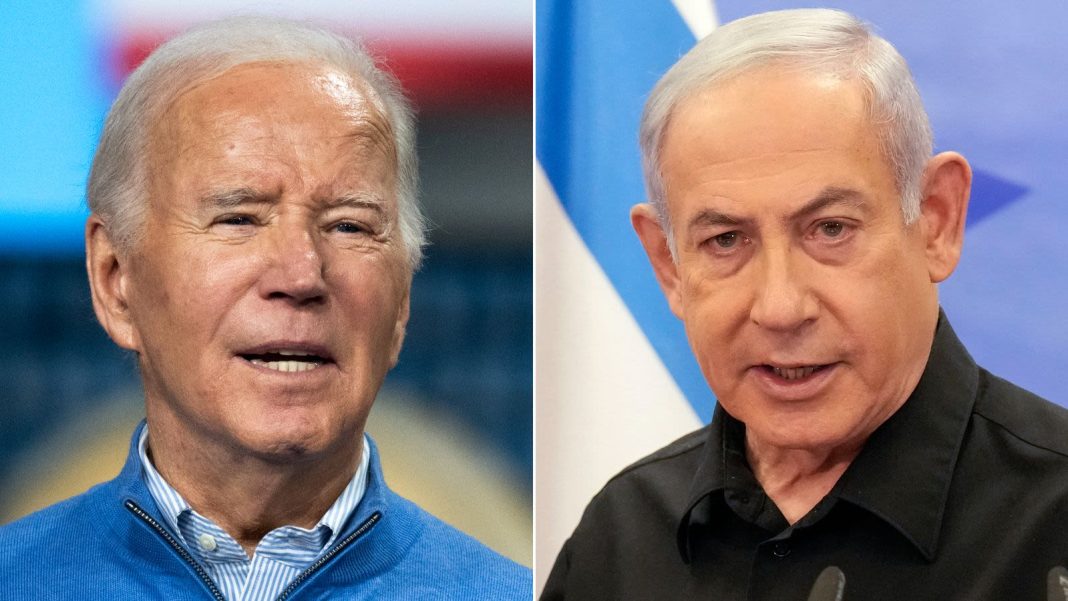The call came as Biden and Netanyahu took a series of veiled swipes at each other over the last several days, with Biden saying in a hot mic moment last week that he would have a “come to Jesus meeting” with the Israeli leader.
White House national security advisor Jake Sullivan told reporters on Monday that Biden and Netanyahu had a “businesslike” call and that Netanyahu agreed to send a technical team of senior military, intelligence and humanitarian officials to Washington in the coming days to discuss the next stages of the war.
First and foremost on Biden’s agenda is preventing a full-scale Israeli invasion of Rafah, the southern Gaza border town where 1.5 million Palestinians are sheltering in squalid conditions.
“The president explained why he is so deeply concerned about Israel conducting major military operations on Rafah,” Sullivan added.
Israel threatened to invade Rafah in early February. The Biden administration pushed back against the plan but stopped short of issuing a full red line over an assault, saying Israel first needed to ensure a plan to evacuate Palestinian civilians.
On Monday, Sullivan told reporters that “Israel has not presented us or the world with a plan for how or where they would safely move those civilians and ensure basic access to things like sanitation”.
Sullivan stated Biden warned Netanyahu against a full-scale invasion of Rafah.
“A major ground operation there would be a mistake, it would lead to more innocent civilian deaths, worsen the already dire humanitarian crisis, deepen the anarchy in Gaza, and further isolate Israel internationally,” he continued.
Monday marked the first call between Netanyahu and Biden since 15 February. In the past month, the White House has seen Israel frustrate many of its policy goals, including allowing more humanitarian aid to enter Gaza.
The call comes as talks to reach a hostage deal between Hamas and Israel stall. The Biden administration has hoped that a six-week truce that allows for the release of hostages could give them space to work out a longer-term ceasefire and de-escalate tensions in the region, ahead of the November US presidential election.
Biden has provided Israel unconditional military and political backing since 7 October, but his support has riled progressives, along with Arab and Muslim Americans who have voiced their frustration at the ballot box, casting “uncommitted” votes in big numbers in the recent Democratic primaries in Michigan and Minnesota.
Nearly 32,000 Palestinians, mainly women and children, have been killed by Israel’s offensive. Meanwhile, the UN is warning that northern Gaza is on the brink of famine.
As the situation deteriorates, the Biden administration has become more vocal on Netanyahu. Biden praised a speech last week by Senate majority leader Chuck Schumer calling for elections in Israel to replace Netanyahu.
On Sunday, the Israeli leader fired back in a CNN interview, calling the speech “inappropriate”. Netanyahu has vowed to follow through with an assault on Rafah and has pointed to the backing of Israel’s public for an invasion.
Responding to criticism that the White House was slipping in its support of Israel, Sullivan said Biden “rejected the straw man, that raising questions about Rafah is the same as raising questions about defeating Hamas”, adding that an invasion would “deepen the anarchy” in Gaza.
Netanyahu said in a statement after the call that he had reiterated “Israel’s commitment to achieving all of the war’s objectives”.
The Israeli premier cited the objectives as eliminating Hamas, releasing all the hostages and “ensuring that Gaza will never present a threat to Israel”.
He also pointed to the provision of “essential humanitarian aid that helps achieve these aims”.
Sullivan stated Israel could achieve its war aims without “smashing into Rafah”, and added the US and Israeli technical teams would discuss targeted operations to eliminate Hamas fighters in Rafah.
